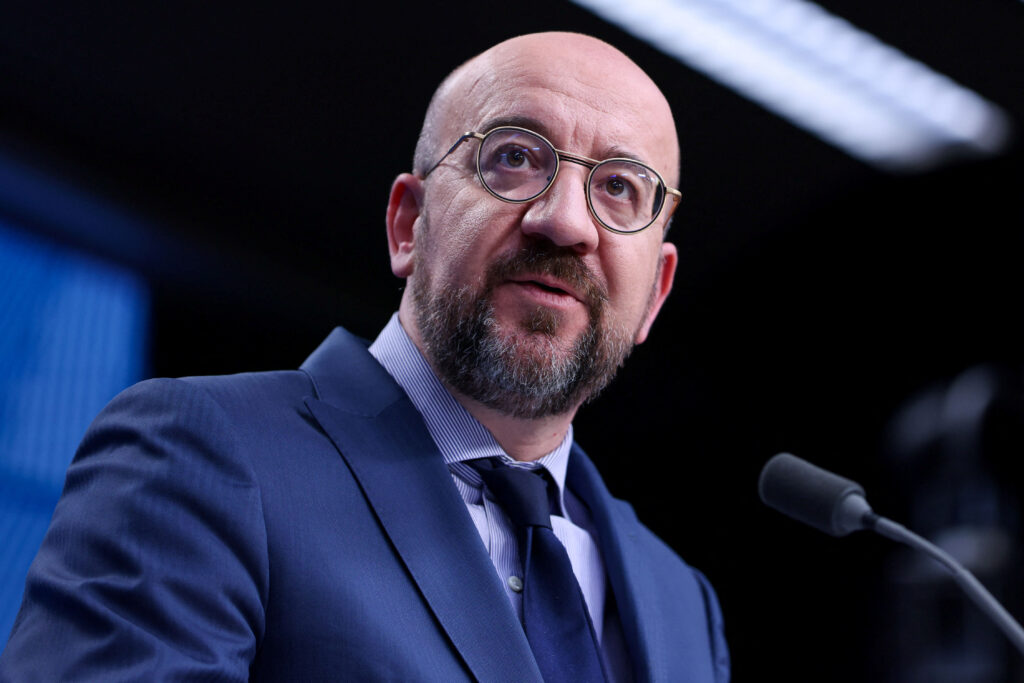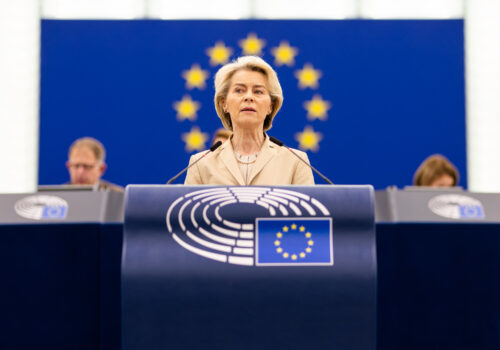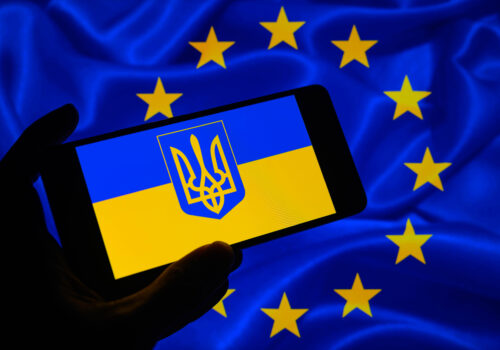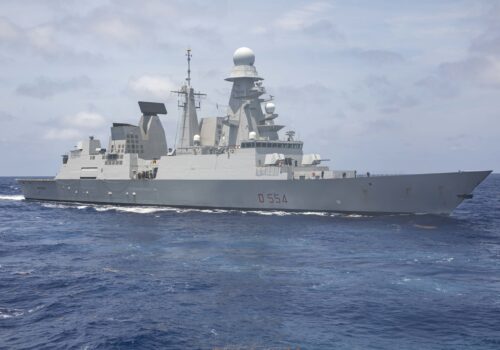“We are not intimidated by Russia, and we are absolutely on the side of Ukraine.” Speaking following a two-day meeting of the European Council, President of the European Council Charles Michel reiterated the bloc’s support for Ukraine. However, to fully appreciate what this support will entail—from possibly seizing Russian funds to helping Ukraine’s reconstruction—requires digging into conclusions that came out of the two-day meeting.
The quarterly meeting of the heads of state or government of EU member states sets the political direction for the European Union. The European Council meeting that ended on Friday offers new insights about EU support for Ukraine, EU enlargement plans to Bosnia and Herzegovina, and a wide range of other issues. Below, Atlantic Council experts answer five pressing questions about what just went down in Brussels and where the twenty-seven-member bloc is headed next.
1. What is the biggest takeaway from the meeting?
The European Council meeting and its conclusions showcase a number of important decisions from the past few weeks. The biggest development was the nod to open accession talks with Bosnia and Herzegovina, a geopolitical move with some caveats intended to provide incentives for further reforms in Sarajevo.
The other big items were either already agreed to at the working level, such as the top-up of the European Peace Facility, or previewed ahead of time, such as the invitation to the European Investment Bank to adjust its rules for defense investments. Yet, it is worthwhile to note two things. First, security and defense was central in these conclusions. This is a welcome signal from leaders that shows Europe’s security remains top of mind among EU member states, though we’ll need to see more tangible progress more quickly soon. Second, support for Ukraine remains strong, but we do see the results of competing domestic political pressures seep into the conclusions. This was most evident in the move, driven by Poland, to establish a cap for tariff-free agricultural imports from Ukraine. It will be worth keeping an eye on these issues.
—Jörn Fleck is the senior director at the Atlantic Council’s Europe Center.
2. What was decided about EU defense?
The conclusions put wind behind the sails of the Commission’s proposals for a European Defense Industrial Strategy and a European Defense Industry Programme. Leaders pushed the Commission, High Representative Josep Borrell, and the Council of Ministers, where EU member states are represented, to “swiftly advance work” on the initiatives. That’s a good sign of the strong appetite among the EU’s members that greater and more collaborative efforts are needed for things like research and development, sustaining demand for companies to produce kit, and ensuring supply.
The conclusions also, as expected, invited the European Investment Bank to adapt its lending rules to increase investments in defense projects. European Investment Bank rules now require the bank to invest in dual-use goods. These conclusions allow for a more liberal reading of the rules and thus provide more flexibility for investment. This cuts to the heart of much of the defense saga: Europe needs cash to fund any defense transformation. Assuming politicians won’t want to take more money away from other spending priorities on things like social issues, there are a few options. You can raise taxes (unlikely now in an election year or ever), borrow the money via joint debt (an interesting proposal, but not happening in the near term with opposition from the more frugal members), or find new money (by leveraging European Investment Bank funds or using Russian windfall profits). This is the question to keep in mind going forward.
—Jörn Fleck
3. What’s the status of EU support for Ukraine?
Like all European Council conclusions or speeches since February 2022, Ukraine is rightly a first-order priority. The conclusions stress the EU’s continued support for Ukraine and its self-defense. Importantly, they effectively endorse initiatives to get Ukraine more materiel and faster. Specifically, they highlight the Czech proposal to buy ammunition from outside the EU as a laudable effort and note the agreement on the top-up of the European Peace Facility agreed earlier this month. However, there will still be bumps in the road.
A potentially significant detail comes buried near the end of the conclusion on the EU’s trade with Ukraine. Agricultural trade has become a topic of concern for many countries, as farmers’ protests continue throughout the bloc. Allegedly unfair and undue impacts on European producers from Ukrainian products entering the bloc have prompted the EU to take action and enact instruments to control the rate of goods from Ukraine that can enter member states. Earlier this month, the EU effectively capped tariff-free movement of certain grains from Ukraine into the single market at 2022 and 2023 levels, and will implement tariffs if imports go beyond those levels. To be clear, this isn’t the EU abandoning Ukraine, but it does show the reality of domestic politics. EU leaders need to balance economic concerns from their electorate while not bowing to the notion that Ukraine fatigue has overrun the continent.
—Jörn Fleck
4. Where do plans for EU enlargement stand?
Bosnia and Herzegovina’s EU accession journey has begun, but the road ahead is challenging. While the EU’s conditional invitation opens the door to negotiations, Bosnia and Herzegovina must undertake significant reforms, particularly in addressing ethnic divisions, strengthening institutions, and combating corruption. This conditional approach provides a clear incentive for progress. However, success will hinge on the EU offering targeted support to ensure these reforms are sustainable. Only through a combined effort can Bosnia and Herzegovina and the EU achieve a truly unified and stable European future.
It’s important to note that the EU’s approach to Bosnia could have positive spillover effects. The olive branch offered by the European Council should be a catalyst for concrete results in the ongoing Kosovo-Serbia normalization dialogue, also facilitated by the EU. This, if successful, could pave the way for granting Kosovo candidate country status soon. This is crucial for the full integration of all six Western Balkan countries into the EU, and for fostering good neighborly relations and regional cooperation.
Furthermore, the EU’s emphasis on internal reforms is a welcome development. It ensures that both the candidate countries and the EU are well-prepared for accession. Clear and timely conclusions on internal reforms by summer 2024 will provide a much-needed roadmap for a more efficient accession process, guaranteeing a smoother integration for future members and the EU as a whole. Importantly, the EU is signaling a shift in its tolerance for regional leaders. The “Jekyll and Hyde” approach, in which leaders project a positive image externally while exhibiting problematic behavior internally, seems to be no longer acceptable for prospective members.
—Ilva Tare is a nonresident senior fellow at the Europe Center and was most recently a broadcaster with EuroNews Group.
5. What should EU watchers look for next?
There will be one more extraordinary European Council meeting in April before the European elections in June. The continent and the Brussels bubble are already in campaign mode. The Commission and the Council will continue their work, but things may slow down in the run-up to June. Keep an eye on the EU’s appetite for coordination on defense and movement on proposals to use the windfall profits on frozen Russian assets to buy ammunition.
—Jörn Fleck
Further reading
Thu, Mar 7, 2024
A geopolitical European Commission is a must for 2025 and beyond
New Atlanticist By James Batchik, Stuart Jones
The next European Commission president will need to prioritize the bloc’s defense transformation and economic security.
Tue, Mar 12, 2024
Ukraine expands EU energy exports in fresh display of wartime resilience
UkraineAlert By
Ukraine is boosting energy exports to the European Union in the latest demonstration of the country's remarkable wartime resilience, writes Aura Sabadus.
Thu, Mar 7, 2024
With Operation Aspides, Europe is charting its own course in and around the Red Sea
New Atlanticist By
The main distinction with the US-UK approach is that the EU operation does not envision any participation in strikes against the Houthis.
Image: European Council President Charles Michel speaks at a press conference on the day of a European Union leaders summit in Brussels, Belgium March 22, 2024. REUTERS/Johanna Geron



